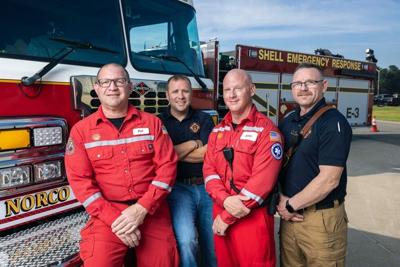Is there any little girl or boy who hasn’t dreamed of being an emergency responder when they grew up? Young kids have a fascination with shiny red fire engines, and the loud piercing sounds of sirens. As they get older, however, fire engines and sirens are associated with a potential crisis or tragedy and the knowledge that help is on the way. Emergency responders make a difference in the community and the lives of others who are experiencing their worst day.
Even without a cape, emergency responders may appear to have superpowers, but their superpower is care for people.
“We don’t have any superpowers,” insists Pat Beard with a smile. A Shell Norco Safety Innovator and member of Shell’s Emergency Response Team, Beard’s heroic denial is quickly backed up by Shell Norco Fire Chief Jason Anderson and former Norco Area Volunteer Fire Department Chief Kenny Wenning Jr. during a recent meeting in St. Charles Parish. The three are full-time industry employees, active with their respective Emergency Response Teams, community volunteer fire departments, and have a long-time partnership with Shell Norco and the Norco Area Volunteer Fire Department.
“Caring for people and being good neighbors are core values to everyone at Shell,” states Beard. “Our Emergency Response Team includes many highly trained volunteers whose job is to keep the site safe, our community safe, and lend support to other industry neighbors.” “Building a relationship with our neighbors and other volunteer responders whether they work for Shell, another industry, or participate as a concerned citizen is a pillar of the responsibilities we take on,” Anderson explains. “Responders are best equipped to keep the community safe when we work together and learn from one another. Our bond is essential and evidenced in every response situation.”
The emergency responders emphasized the long-standing connection between Shell and local volunteer fire departments. Shell Norco responders have not only been members of the volunteer team, but now retired employees like Tommy Barreca and Craig Matherne have also served as Volunteer Fire Chiefs. Wenning recently turned his Fire Chief duties over to Shell Norco Emergency Response Lead Michael Heath.
“Norco is a community surrounded by industry,” says Chief Kenning. “We’re in the midst of highways,? pipelines, businesses, and residences within a significant transportation hub.? Training together and knowing each other on a first-name basis goes a long way to successfully manage an incident as one team. We’ve done that.”
“There’s a unique camaraderie among emergency responders that you won’t find anywhere else,” Anderson says. “We’re one team, one family… and that extends across the country. No matter the color of our uniforms or the name on our engines, we all have a common goal: to keep our community and our neighbors safe.” “That’s true,” agreed Wenning, “Watch two emergency responders meet for the first time. The handshake is strong, the conversation is strong. There’s no competition or bragging about how many calls were answered. Relationships grow from that first handshake.”
“Emergency responders are tough, and sometimes we do believe that we have superpowers,” he grinned. “When you combine the adrenalin that comes with disaster response and extensive training, there’s an energy that pushes you forward. The fellowship we have is essential and evident every time we are called to duty. Hurricane Ida was a rough time for many of us. The Norco community was trying to get back into homes to begin the rebuilding process, industries were recovering and starting up, there were potential incidents 24 hours a day for weeks. Because we were one team, we got through it. Emergency responders throughout the parish called each other, relied on each other, and got quick assistance. Every resource in the area was utilized.”
“Unfortunately, you can’t always immediately say ‘yes’ in times of natural disasters,” said Anderson. “But we always say, ‘let us figure out a way to help.’ In the aftermath of Ida, Shell Norco sent responders and employees from the site into the community to help with home restorations, salvaging valuables, and shoring homes for safer living conditions. We were dealing with recovery issues on our site but also able to help people in the community, extending the reach of the Norco Area Volunteer Fire Department.”
In the aftermath of Hurricane Ida, Shell responders circulated throughout the community not only to keep an eye out for potential safety incidents, but also to make daily deliveries of ice, food, and water. “We fed hundreds of people a day,” Beard recalls. “Making a positive impact on the community is an undefined part of our responsibility and caring values. But it’s an important part.”
Anderson, Beard and Wenning repeat, “we are not heroes.”? But if those who help others in need on their worst days, extinguish fires, rescue families trapped inside cars, make the day better with a helping hand, and respond to crisis in minutes are not called heroes, they are called emergency responders.
? ? ? ? ? ? ? ? ??

